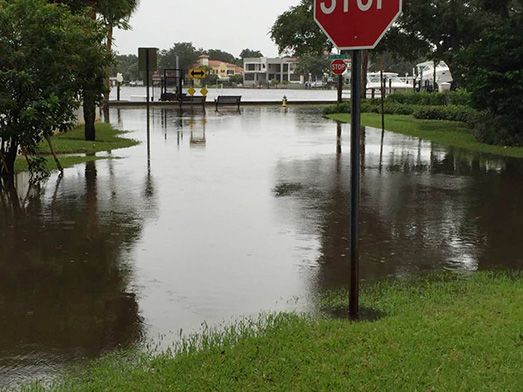

Transcendent Lessons from Hurricanes
Source/Author: Adrianne Finley ODell, Assistant Head of School
September 02, 2016
Hunkered down at home getting minute by minute weather updates on Hurricane Hermine these last few days, I thought back to my first experience with a hurricane. Having grown up in Ohio, hurricanes were not part of my experience. I had just begun graduate school at the University of Hawaii on the Island of Oahu, however, as Hurricane Iniki, a Category-4 storm, carved a path right through the Hawaiian Islands. Iniki hit Hawaii just weeks after Category-5 Hurricane Andrew hit Florida, devastating parts of our state.
Iniki ultimately had a direct hit on the Island of Kauai, leaving it completely cut off from the rest of the world for a time as cell phone towers were downed and planes couldn’t even take off or land at the airport due to the destruction. The people of Kauai had to rely on each other to get through the next number of days with no ability to communicate, no electricity, no running water, and great difficulty traveling around the island as a number of roads were not passable.
Iniki ultimately had a direct hit on the Island of Kauai, leaving it completely cut off from the rest of the world for a time as cell phone towers were downed and planes couldn’t even take off or land at the airport due to the destruction. The people of Kauai had to rely on each other to get through the next number of days with no ability to communicate, no electricity, no running water, and great difficulty traveling around the island as a number of roads were not passable.
Andrew. Iniki. Katrina. Sandy. Ike. Wilma. These names likely evoke some painful memories for some of us, and we have learned a lot from these experiences. Our systems of warnings, predictions and preparations have improved significantly over the last 25 years. But what are the human lessons that we can learn from these and other natural disasters? Lessons that hold true regardless of the situation we are in? Lessons we can share with our children when they are going through difficult times? There are certainly many, but I will share three that are top of mind for me:
- Acceptance. When we truly accept that there are some things we cannot control, it helps us to move past the stage of complaining, anger, and frustration to a healthier state where we can begin to assess our situation, troubleshoot, and take positive action. We each have a choice, moment by moment, of how to respond to a situation that is not one of our choosing. We all have that power within, and when we draw on that power we recognize what is truly one of the few things we can control—our attitude.
When our children come home from school upset about an interaction with a fellow student, a result on a test or quiz, or a disappointment in an athletic performance, we can listen with empathy and help them reframe their thoughts. In the Lower School, the faculty’s Love and Logic philosophy builds independent problem-solving skills for children. Faculty understand that people learn best from making their own decisions rather than trying to “fix it” for them. With practice, children can learn to accept the situation they are in, control their emotional response, and make choices that are empowering for them.
- Perseverance. We are so much stronger than most of us think we are. The human mind has incredible capacity to carry us through difficult times. I remember last year all of the special reports on the news about the ten-year anniversary of Hurricane Katrina. The reports focused on the perseverance of the people of New Orleans to rebuild. The city was devastated. Support systems we take for granted were no longer there—grocery stores, gas stations, churches. But some people talked about how the disruption from the storm was a gift to start over, to do better. They found purpose in and passion for the rebuilding.
This determination, this resilience through difficult times, has recently been tagged “grit.” Dr. Angela Duckworth of the University of Pennsylvania has written and spoken on this topic extensively. Dr. Duckworth was a seventh grade teacher before going to graduate school to get her PhD. She was very interested in what made some students more successful than others. She learned through her research that it had little to do with intelligence as measured by test scores, rather it had to do with a combination of perseverance and passion that she coined “grit.” We can help our students cultivate grit by encouraging their efforts even more than the end result. We can help them recognize that they are among the great thinkers and inventors who didn’t give up when they ran into stumbling blocks, but rather continued their efforts until they found an answer. We can share with them that, in fact, failure is a necessary ingredient in the recipe of success.
- Connectedness. After each natural disaster, we see people coming together to help each other, to physically rebuild and emotionally build each other up. The people on the island of Kauai didn’t have anyone but each other. There was no opportunity for residents of other states to come to the island to help in the aftermath of Iniki due to debris and destruction on airline runways, and even piers were destroyed preventing much support by water. Helicopters were the only form of transportation in and out of the island for some time. You may have heard the Hawaiian word “Ohana”, which means extended family. This is not just a saying in Hawaii, it is a value that is alive on a daily basis. As a person coming to Hawaii for school, I was not a local. That did not stop me from being embraced by my new friends in Hawaii - some Native Hawaiians who taught me about the values and customs of their culture and the true meaning of aloha, some Filipino families who welcomed me into their homes and introduced me to their customs and cuisine, some Japanese families who opened up to me about their cultural experience in Hawaii, and a number of Pacific Islanders and Korean families who exposed me to their own unique culture. The people of Kauai leaned on their Ohana to get them through the most difficult days after Iniki. We see this time and again after natural disasters, when a very challenging time brings people together.
One of the things I love about Shorecrest is the PK-12 model where we have families with children of all ages all on one campus. Our recent Fall Family Tailgate sponsored by the Booster Club before the first football game was a great example of a community coming together to celebrate our shared experience.
There are opportunities all year long for students of different grade levels to come together, whether for academics, service, athletics or social activities. We may have difficult times on occasion, and we may have differences now and then, but when we recognize the great opportunity that is afforded to us to be a part of a special community like Shorecrest, my hope is that we will acknowledge the gift we have in front of us (acceptance), think closely about ways we might overcome differences (perseverance), and look for ways to connect in our shared humanity.
























